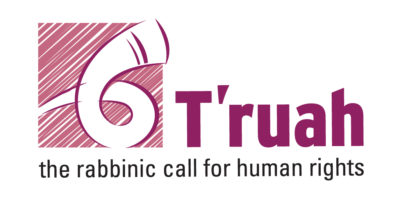The Jewish community has always valued disagreement and dissent. Indeed, the pages of the Talmud are filled with arguments among ancient sages. In one famous Talmud passage, Rabban Gamliel establishes strict standards for entry to the Beit Midrash (study hall). Once he is deposed, the new leader of the Beit Midrash flings the doors open. On that day, the Talmud tells us, 400 or 700 benches were added to accommodate the new students and some of the most perplexing problems were solved.
Because of our commitment to free speech, which is central to Judaism, to the U.S. Constitution, and to human rights law, T’ruah expresses deep concerns about “The Israel Anti-Boycott Act,” now moving through the U.S. Congress.
T’ruah does not support or affiliate with the Boycott, Divestment, and Sanctions (BDS) campaign. We do, however, believe that free speech—including the right to boycott—is an essential component of democracy, a basic human right, and a fundamental value of Judaism. And we believe that the Anti-Boycott Act threatens in the long-run to harm both Israel and the chance for a just and peaceful solution that protects the human rights of both Israelis and Palestinians.
As written, the Anti-Boycott Act may only serve the narrow purpose of extending a 1979 law preventing U.S. corporations from being forced into a boycott declared by a foreign government to apply also to a boycott of Israel declared by the United Nations—even though no such boycott exists. Even if the law has no immediate practical implications, we are concerned that it opens the door to broader applications that will compromise the right of free speech of individuals, and that it may lay the groundwork for more restrictive federal and state laws.
We are also concerned that this law eliminates the distinction between Israel’s internationally-recognized borders and the occupied Palestinian territories. Those of us committed both to the long-term security of the State of Israel, and to an end to the occupation that both threatens this security and violates the human rights of Palestinians, must insist on maintaining the distinction between Israel and the territory over the Green Line.
Dissent only sharpens our understanding and strengthens our community.The response to views with which one disagrees must be thoughtful and respectful argument, not silencing. Therefore, we urge Congress to reject “The Israel Anti-Boycott Act,” which does nothing to support Israel, and only threatens free speech and distracts from the real work of pursuing a peaceful and just resolution that protects the human rights of both Israelis and Palestinians.

